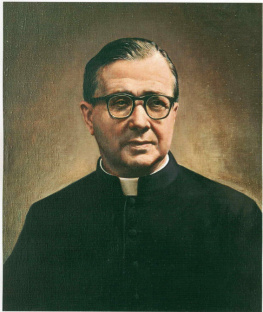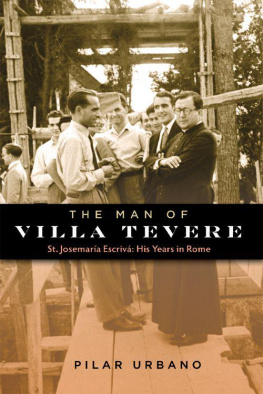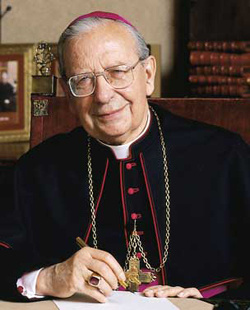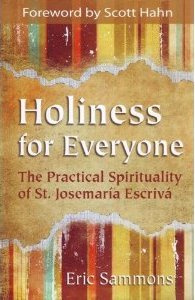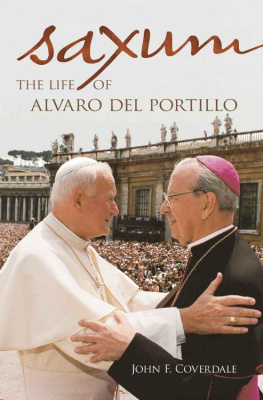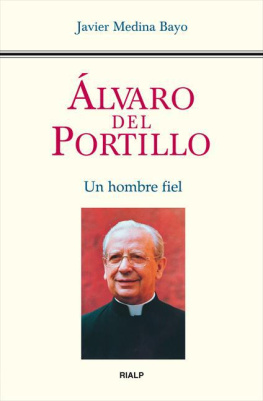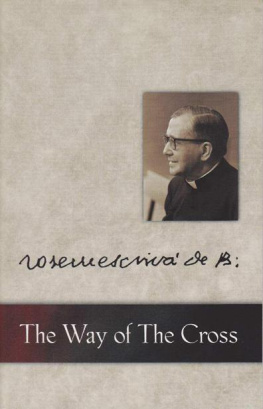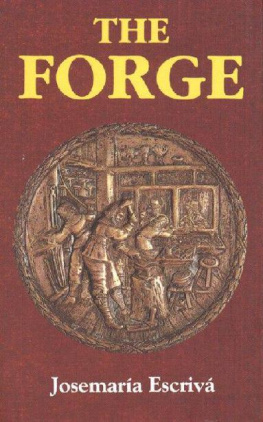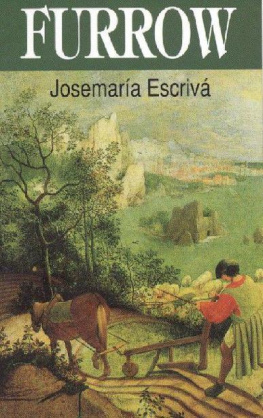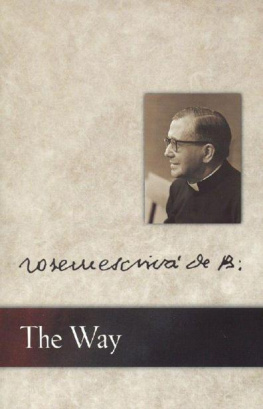1. A Son of the Church
The decree on the heroic practice of virtuelived by Msgr. Jose mara Escriv, the decreepromulgated by Pope John Paul II on April 9, 1990, situates the founder of OpusDei in a definite context within the Church: that of the call to holiness ofall baptized Christians, which in the words of Pope Paul VI is "the mostcharacteristic element of the conciliar magisterium,and, so to speak, its ultimate purpose." Msgr. Escriv, whoever since October 2,1928, had dedicated all his energies to proclaiming theuniversal call to holiness, had clearly been in "prophetic congruence withthe Second Vatican Council."
The founder's love for the Church and hisdesire to serve her are an evident feature in all his writings, his preaching,and his life itself. I would like to begin with this question: How did Msgr. Escriv expresspersonally his deep conviction that he was a son of the Church?
I shall never forget his first arrival inRome. It was June , 1946.The Father was then forty-four years old. I had been in Rome since February ofthat year, because he had assigned me several tasks related to the gaining ofpontifical approval of the Work. Since certain features of Opus Dei representeda complete innovation relative to the canon law then in force, I worked to thebest of my ability to follow the exact directions of the founder. However, Iwas told, among a number of other things, that it was not yet possible toobtain an approval for Opus Dei; that we had been bornand these were the exactwordsa century too early. Finding myself in such an apparently insuperabledifficulty, I decided to write to the Father to tell him that his presence wasneeded in Rome.
At that time he was suffering from diabetes.His condition was, in fact, so serious that his physician, Dr. Rof Carballo,refused to take any responsibility for his life should he undertake thejourney. Nevertheless, on June 21 the Father sailed from Barcelona on an oldsteamer, the J.J. Sister, having consulted with the General Council ofOpus Dei and having entrusted himself to Our Lady of Mercy.
After a voyage that was quite harrowingbecause of an exceptionally violent Mediterranean storm, the ship reached theport of Genoa on June 22, a little before midnight. In the meantime, I had cometo meet him from Rome, together with another member of Opus Dei, SalvadorCanals. Salvador and I stopped at a modest inn beforehand, to book rooms forthe night. I recall that we ate a very frugal dinnerwe were still very much inthe postwar periodand for dessert we were served some Parmesan cheese. I wasnot acquainted with this type of cheese; but I tasted it, and I liked it somuch that I saved the rest of it for our founder. I had no idea that this wouldturn out to be the first food he had had in forty-eight hours. The Fatherafterward would often tease me about that little present!
Next day the founder celebrated his firstMass on Italian soil, in a church badly damaged by bombing. The drive to Rome,in a small rented car and along ruined roads, was a quite uncomfortable one,and seemed to go on forever. But the Father was full of joy and made nocomplaint; he was delighted that one of his greatest aspirations, viderePetrum [to see Peter], was being fulfilled.During the whole ride he prayed fervently for the pope.
At nightfall on June 23, we arrived in Rome.At the first glimpse of St. Peter's from the Via Aurelia, theFather, deeply moved, said the Creed. We had rented some rooms on the top floorof a building at 9 Piazza della Citta Leonina; there was abalcony from which St. Peter's Basilica and the pontifical palace could beseen. When he went out on this balcony and saw the rooms occupied by the Vicarof Christ, the Father said he wanted to remain there awhile; and so he did,staying recollected in prayer while the others, exhausted, went straight tobed. Out of love for the pope, made all the more palpable by this proximity tothe papal apartments, and without a thought for his fatigue, for his diabetesand the intense thirst which this must have been causing him, or for the tolltaken on him by the hardships of his long sea voyage, the Father spent thewhole night in prayer, on that balcony.
This episode gives us some idea of theintensity of the founder's love for the Church and especially the pope. Andyet, though he had an intense longing to pray at the tomb of St. Peter, sogreat was his spirit of mortification that he waited several days beforecrossing the threshold of St. Peter's.
On June 30, the Father was able to write tohis sons in the General Council (which at this time was still located inSpain): "I have a signed photograph of the Holy Father addressed to 'theFounder of the Priestly Society of the Holy Cross and Opus Dei.' What a greatjoy! I have kissed it a thousand times. We are living in the shadow of St.Peter's, next to the colonnade."
On August 31, the founder was able to returnto Madrid with a legal document from the Holy See in "praise of theobjectives" of Opus Dei; such a document had not been granted for nearly acentury. The difficulties were beginning to be overcome.
On October 22, 1946, the founder returned toBarcelona to thank Our Lady of Mercy. On November 8, he again left Madrid forRome, the city which would be his habitual residence until the day, almostthirty years later, when God called him to himself.
Our Father w as wellreceived in the Roman Curia, especially by the then undersecretary of theVatican Secretariat of State, Msgr. Montini (later Pope Paul VI). But he metwith difficulties from some churchmen. Sometimes he said he lost his innocenceafter coming to Rome...
Nevertheless, his own responses were alwayscharacterized by a profoundly supernatural outlook. He often visited St.Peter's to recite the Creed before the tomb of the Prince of the Apostles. Heused the version taught to him by his mother when he was a little boy; and whenhe reached the words "I believe in the holy Catholic Church," headded the adjective "Roman," and then, parenthetically, he added"in spite of everything." He once confided this custom of his toMsgr. Tardini [In Italian and some other languages, bishops are commonlyreferred to as "Monsignor." Since in some cases it is not clearwhether or not the person was a bishop at the time of the incident mentioned,we have in those cases simply kept the Italian usage. Msgr. Escriv, ofcourse, was not a bishop.] (I was there at the time, but I don't remember ifthis was before or after he became cardinal secretary of state), and thatprelate asked him, "What do you mean, 'in spite of everything'?" TheFather replied, "I mean, in spite of my sins and yours."
He did not, of course, intend this as anydisparagement of Msgr. Tardini. If, as we know, nobody is exempt from sin("the just one falls seven times a day" [Prv 24:16]), our founder meantonly to emphasize the need for those who assist the pope to be very holy andfilled with the Holy Spirit, in order that there be more sanctity throughoutthe Church.
As he often said, the Church, inasmuch as sheis the bride of Christ, is without blemish; therefore, while he recognized thereality of human limitations, he would not accept or justify the false humilityof certain ecclesiastics who seemed perennially disposed to be ashamed of theChurch; what he called the attitude of "mea-culpism" was mostdistressing to him. He was convinced that the recognition of human failingsshould never be allowed to cloud over one's faith in the objective sanctity ofthe Church.
Our Father met three popes. What was hisrelationship with the first of them, Pope Pius XII?
Pope Pius received the Father in audiencemany times. He showed his own esteem for the Work by granting the first twopapal approvals: the DecretumLaudis in 1947, and the definitive approvalin 1950. To express his affection for the Holy Father, our founder did allkinds of things, even offering him simple little gifts. For example, he oncebrought him some oranges which he had received from Spain, at a time when wecould hardly afford to buy food for ourselves; another time, knowing that the HolyFather liked a certain Spanish wine, he obtained some bottles of that wine andgave them to him as a present.
Next page
